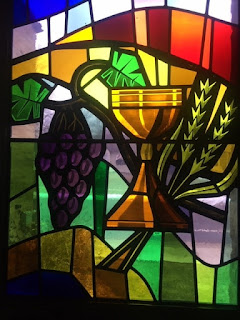Sometimes I think there are limits separating possible and impossible, private and public. And when I read this story about Jesus at a wedding in Cana (John 2:1-12) those lines disappear.
John told this story of Jesus' first sign of power. Jesus, his mother Mary, and some friends were in attendance at a wedding feast.
The wine ran out. For the host it was a private personal social catastrophe. But what was it to Jesus?
Mary turned to Jesus to tell him the news. Jesus asked back, “Woman, of what concern is that to us. It's not my time yet.” I've heard these words read over many years now. I've thought sometimes as I listen that Jesus was terse and disrespectful. But Mary wasn't deterred by Jesus' response. She directed the servants to follow her son's instructions.
Some commentators, like Roy Harrisville III, think this was a private miracle. But I'm not so sure Jesus would have cared if it was public or private. Harrisville writes,
This is a private miracle, subdued and quiet. It is not some flashy show of divine power. Only a few people, including the reader, know what actually happened. Jesus was even reluctant to do anything at the event. It was not meant to happen, but the persistence of his mother led him to perform what has become one of the most famous of his miracles.
Harrisville's right, the story changes when Jesus moves. It's the same today. When God moves the lines of possible and impossible disappear. But the lines of private and public vanish too. God took on the problem. It was no longer the hosts problem alone. It happened at Cana and it happens in the lives of God's people far beyond Galilee. When we think we're alone God's movements remind us that we are not alone.
I wonder what God thinks when we say somethings impossible. I also wonder what God thinks when we think we're alone with our troubles and problems. And then I remember that for God all things are possible (Mark 10:27). For Jesus all situations and people are redeemable. This is how God works. This is as
David Lose argues how grace works.
...I’m grateful for John to remind us that grace isn’t only about making up for something we lack, but also providing more than we’d ever imagined or deserve. 2
John tells us six stone jars were there. Each jar had a capacity of 20 to 30 gallons. Jesus directed them to be filled. The water was drawn out and tasted by the chief steward. He didn't know where it came from but what he tasted, wow.. What he tasted wasn't water—it was was wine. More than just wine it was the good stuff even better than what was served before.
If God hadn't moved the party would have ended. But Jesus stepped in bringing abundant blessing. The host's private disgrace was now a miracle that everyone could savor.
We often think faith is private, between, just” me and God”. But when God moves in our lives the lines of private and public disappear right along side of the limits of possible and impossible. For Jesus there's always power to transform our world and grace that transcends our limitations.
This is how God works. The signs and miracles are God moving revealing himself. Jesus gives not just enough but plenty. Mike Rogness says,
Surprise and shock always accompanied Jesus' signs and miracles. Here he surprises everybody—Mary, who probably wasn't sure what he would do; the servants, who were baffled when Jesus told them to fill the jars with water; the steward, who was taken aback at the excellence of the wine; no doubt the host, who was facing acute embarrassment upon hearing that the wine was running out; and finally the entire assembly, when suddenly their next goblet of wine was far better than anything they had drunk so far.
How often we lifelong Christians lose that sense that Jesus intends to remake us. We have come to expect that being a Christian is a good way to live, a rather acceptable and comfortable brand of vin ordinaire, as the French call their table wine. But just when life is going rather well, Jesus means to shower us with the really good stuff
Rogness, Michael. "'You are my son, the beloved': the Epiphany gospels." Word & World 24, no. 1 (2004 2004): 86-94. ATLA Religion Database with ATLASerials, EBSCOhost (accessed January 12, 2016). page 87-88
The steward was surprised the best wine had come out at the end of the feast. He didn't know about the miracle—all he knew was that the best wasn't usually saved for last.
But God often works this way revealing presence and power when we think God is absent or powerless. When God moves we often see the best is saved both for last and for the least. Jesus says
- the last someday will be first Matthew 20:16
- the servants among us will be the greatest Matthew 23:11
- he came among us to servant John 13:12-17
Peace, and thanks for reading. John

